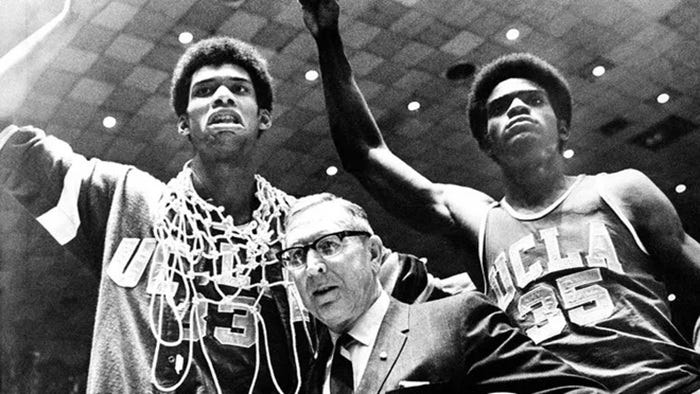
You don’t have to be a college basketball fan to have a passing knowledge of legendary coach John Wooden.
His teams won 10 NCAA championships in a 12-year span including seven in a row from 1967-1973 and once had an 88-game winning streak.
Wooden won the Henry Iba Award as national Coach of the Year a record seven times, won the AP award five times, and was known as the “Wizard of Westwood.”
It doesn’t have the same ring to it, but if not for a snowstorm in April of 1948 he could have instead become the “Wizard of Dinkytown.”
Minnesota was looking for a head basketball coach when athletic director Frank McCormick got caught in a blizzard while visiting a friend in South Dakota.
McCormick had offered the position to Wooden, the head coach at Indiana State at the time. Wooden accepted the job but only if he could bring in his own assistant coaches.
However, McCormick wanted Wooden to keep Dave MacMillan as an assistant coach after he had resigned as the head coach, citing health reasons.
MacMillan had another year left on his contract. To get approval to let MacMillan go and pay him and add Wooden's coaches to the budget, McCormick needed permission from U of M President Lotus Coffman.
Eventually McCormick did get approval to allow Wooden to hire his own coaches, but the snowstorm had cut off phone lines in South Dakota and McCormick couldn't get in touch with Wooden.
Having not heard from McCormick for a couple of days, Wooden accepted the job at UCLA and as they say, the rest is history.
The Gophers hired Ozzie Cowles, who had been named the Big Ten Coach of the Year at Michigan the previous season.
He led the Gophers for 11 seasons, finishing fourth or better in the conference in seven of those seasons. However, Cowles was not able to lead a team to a title, as his teams had done at previous coaching stops at Carleton College and River Falls State College (now Wisconsin-River Falls).
Cowles had a defensive focus, taught "control basketball" and was "often criticized by Big Ten opponents for using a deliberate style of play." In 1957, he was in the minority in opposing the introduction of a 30- or 24-second rule to college basketball, arguing that "it makes teams take shots they shouldn't take."
Earlier, Cowles had been an outspoken opponent of a 1950 rule limiting a fouled player to one free throw if he was not fouled in the act of shooting. Believing the odds were better, Cowles ordered his team to refuse all free throws (and instead opt for a jump ball as was permitted under the rules at that time) in a game against Michigan State. Despite losing to the Spartans and being "hooted" by fans, Cowles ordered his players to follow the same strategy in several additional games.
Minnesota had a 147-93 record under Cowles, a .613 percentage. The Gophers were 86-68 (.558) in conference play.
To call Wooden’s career at UCLA as legendary is underselling it. He has to be the most dominant figure in college basketball history.

He won 10 NCAA national championships in a 12-year period, including a record seven in a row from 1967-1973. No other team has won more than four in a row. In one stretch during that period, his teams won an NCAA men's basketball record 88 consecutive games.
The Bruins had four perfect 30–0 seasons, won 38 straight games in NCAA tournaments and 98 straight home wins at Pauley Pavilion. Wooden’s teams were 150–3 at Pauley over 10 seasons.
Wooden was 620-147 (.808) at UCLA. His overall record was 664-162 (.804).



